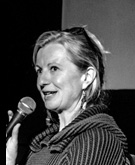 Eva Profousová
Eva Profousová
Foto © Thomas Rommel
(born 1963 in Prague) studied Bohemian Studies, Russian Studies and East European History in Hamburg and Glasgow. From 1992 to 2002 she was the director of the Honorary Consulate General of the Czech Republic in Hamburg. Since 2002 she is a freelance literary translator and journalist. She translated numerous prose writers and playwrights into German, i.a. Jáchym Topol, Radka Denemarková, Jaroslav Rudiš, Michal Viewegh, Miloš Urban, Tereza Boučková, Petr Zelenka or Jan Pitínský. She has been awarded many prizes for her translations – 2012 the George Dehio Award for the Advancement of Books (together with Radka Denemarková), 2010 the Award for the Advancement of Literary Translations from the city of Hamburg. Eva Profousová lives in Hamburg.
How did you end up being a literary translator?
At the very beginning I actually began to study translation and interpretation in Prague, but then I fled the country and never thought that I would work as a translator. In Hamburg I tried to at first and then quit and thought I would become an academic. After the fall of the wall I briefly worked at the embassy where I met Tomáš Kafka, the cultural attaché at that time, poet and translator – and suddenly I thought: translation is actually a great thing and something I could try.
The decisive moment for me was as Sister by Jáchym Topol was published. This book was incredibly important for me and I knew I wanted to translate it. And that’s how it luckily came together to where I translated it together with my friend and former roommate, with Beate Smandek. For me this was also the moment I returned to Prague from emigration. I believe this is also the reason why I have to translate: for me this means that I engage in and deal with where I come from. As I see it, I am not a translator but a mediator.
You have been a literary translator already for a long time, how does Czech literature fare in the German-speaking countries in your opinion?
Not as well as in the past. After the fall of the wall there was a considerably high demand for Czech literature, one wanted to rediscover the country through literature. There were many readings and reading tours of Czech authors across Germany. Meanwhile I have the impression that today one increasingly is in search of books that sell well and have the potential to become bestsellers, which is rarely the case for Czech books. In the past two, three years the fact that the Department of Foreign Affairs is not financially supporting the translation of East European languages anymore is making itself felt in the number of translation jobs. The publishers know that they will not make a profit with this. One would have to sell at least 7,000 copies of the book so that there will be a positive return, and this is not the case for Czech books. Those authors who already have a German translation might not have as much of a plight, but not always. This happens again and again, also with Jáchym Topol, Jaroslav Rudiš or lately with Radka Denemarková –not automatically does previous translations infer that further books are also translated immediately. One repeatedly looks at sales numbers which is actually very bitter.
Do you have an author who you especially like to translate? And are there differences between books that you enjoy reading and those you enjoy translating?
I have only discovered that there are books one enjoys reading because they are nice and entertaining. And while translating one realizes that they are not written well at all. One does not really realize this during a quick read, but when one has to recreate this in the other language, it becomes aggravating. But in general I would like to translate a book that I find interesting and that resonates with me.
How is it with both languages for you when you compare German and Czech – are here things that are especially difficult to translate or in turn areas in which both languages are similar?
They are much more similar as I would have thought earlier, we have a similar basic structure, also when thinking… the pictures often correlate. In a certain sense we are lucky that we translate from Czech into German. One easily notices that the two languages have lived next to each other for a long time. At least this is my subjective viewpoint.
Something I always have difficulties with is the sudden tense change. In Czech this often happens and not always is it possible to exactly understand why. This irritates me sometimes. What I personally consider to be a big problem is that in the colloquial Czech language a great number of German malapropisms exist. For this I still do not have a patented solution, with each book I try to find a different solution because this aspect plays a different role with each author. This distresses me sometimes.
Are you currently working on a specific translation or do you have a book you have discovered that you would like to translate?
For a little while I took a break from translating but at this moment there are two projects on my desk. Currently I am translating a book that fits our conversation: Konec punku v Helsinkách by Jaroslav Rudiš. It is set in Leipzig even if the city is not mentioned. And for this book the great challenge for me is to find a language which is supposed to be used by Czech punks. For this one needs a type of slang – Rudiš uses in part the German language because the heroine has a German grandma – and now I try to find some linguistic reference points in documents on the East-German punk scene. And once I am finished with this book there is already another novel waiting for me, also very interesting even though linguistically completely different: Žítkovské bohyně by Kateřina Tučková, which will be published by DVA.
Just recently I discovered a book for myself which was self-published in the Czech Republic and which I very much would like to translate: Hejno bez ptáků by Filip Doušek. I really liked it and though that it would be a trendsetter of sorts, which one could also need in Germany. It’s on new paradigms we have to find in our way of thinking in order to be able to perceive the world in a different way. However, as of yet no publisher has dared. In addition I would also like to very much translate Jan Balabán’s Zeptej se táty, which also a book no one would like to publish because it is too gloomy and because it not only deals with death but also with religion. This is not always well received here. At least not by the publishing houses I have suggested this novel to. One wants something from Eastern Europe that is light and funny and not always so… thought-provoking.
Eva Profousová speaking with Martina Lisa in Leipzig
Relying on the structure and methodology of classical and postclassical [...]
For further information on translation, the TransStar project and the [...]
Relying on the structure and methodology of classical and postclassical [...]
Sir or Madam, In co-operation with KulturKontakt Austria, the Austrian [...]
Five short films with translations (videopoetry) were made as part [...]
Translating Cube: Six Sides of European Literature and Translation Berlin, [...]
Programme (PDF)
Five short films with translations (videopoetry) were made as part [...]
Translating Cube: Six Sides of European Literature and Translation Berlin, [...]
Programme (PDF)
Translating Cube in Tübingen Reinold Hermanns: SWR2 Journal am Mittag, [...]
Being Exchanged: Between Paris, Stuttgart and Ivano-Frankivsk Yuri Andrukhovytsh, Lubomír [...]
Five short films with translations (videopoetry) were made as part [...]
Bookstore: http://www.edition-fototapeta.eu/geschichten-erzaehlen
More here (PDF). Bookstore: https://knjigarna.ff.uni-lj.si/si/izdelek/1623/pet-poti-do-prevoda/
Five short films with translations (videopoetry) were made as part [...]
Bookstore: http://www.edition-fototapeta.eu/geschichten-erzaehlen
More here (PDF). Bookstore: https://knjigarna.ff.uni-lj.si/si/izdelek/1623/pet-poti-do-prevoda/
Translating Cube: Six Sides of European Literature and Translation Berlin, [...]
Programme (PDF)


